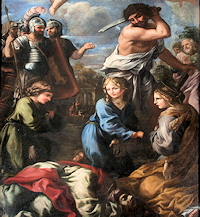Ordinary Time: January 19th
Saturday of the First Week of Ordinary Time
Other Commemorations: Sts. Marius, Martha, Audifax, and Abachum, Martyrs (RM)
» Enjoy our Liturgical Seasons series of e-books!
Sts. Marius, Martha, Audivax and Abachum were a group of Roman martyrs of the third century. St. Canute was king of Denmark; he was put to death out of hatred of his faith and his zeal in working for its extension in his kingdom. He was killed in St. Alban's Church in Odense. Their feasts are no longer on the General Roman Calendar but are still celebrated according to the 1962 Missal of Bl. John XXIII.
 The Week of Prayer for Christian Unity
The Week of Prayer for Christian UnityToday's theme is Pray always, trusting God alone. "Give thanks in all circumstances" (1 Thessalonians 5, 18).
Praying is rooted in the trust that God is powerful and faithful. God alone is the one who holds all in his hands, the present and the future. His word is credible and truthful.
Prayer
God of all creation, hear your children as we pray. Help us keep our faith and trust in you. Teach us to give thanks in all circumstances, relying on your mercy. Give us truth and wisdom, that your church may arise to new life in one fellowship. You alone are our hope. Amen.
Meditation: Patience and Union with God
Being convinced that it is only in so far as my works are united with the merits of Jesus Christ that they are satisfactory and meritorious, it follows that my great aim should be to unite myself as closely as possible with Jesus Christ and His sufferings in all my actions, and thus it would matter little what I am engaged at.
But how is this union to be effected?
St. Benedict tells us "We share in the sufferings of Christ by patience." This little sentence gave me a great light. The life of a saint must be one of great and mysterious sufferings. Patientia=Sufferentia.
"If anyone will come after Me, let him deny himself," says Jesus. This shows that it is suffering which draws us near to Jesus. "He who dos not take up his cross daily and follow Me, cannot be My disciple." Therefore all other methods which do not include this are founded on error.
—Blessed Abbot Columbia Marmion, A Master of the Spiritual Life, p. 71
St. Marius and Family
Their feast does not appear in the Roman calendar until the twelfth century. The Acts of these martyrs are wholly legendary. They give the following details: Marius was a Persian of noble extraction. With his wife, who was also noble-born, and his two sons, Audifax and Abachus, he came to Rome during the reign of Emperor Claudius II (268-270) to venerate the graves of the martyrs. They visited the Christians in prison, encouraged them by word and deed, and shared with them their goods. And like Tobias of old, they buried the bodies of the saints.
It was not long before they themselves were arrested; and when neither threats nor allurements could make them offer sacrifice to the idols, they were savagely flogged. Martha was the first to die, but not before she had fervently exhorted her husband and sons to endure steadfastly whatever tortures might be inflicted for the faith. All were beheaded in the same place and their bodies thrown into the fire. Felicitas, a saintly Roman woman, succeeded in recovering the half-burnt bodies and buried them on her estate.
Highlights and Things To Do:
- Little is know about these early Christian martyrs. See the Catholic Encyclopedia and Catholicsaints.info for further reading.
- This family's relics met with all sorts of conflicts and travels. Some relics can be found in Prüm Abbey.






